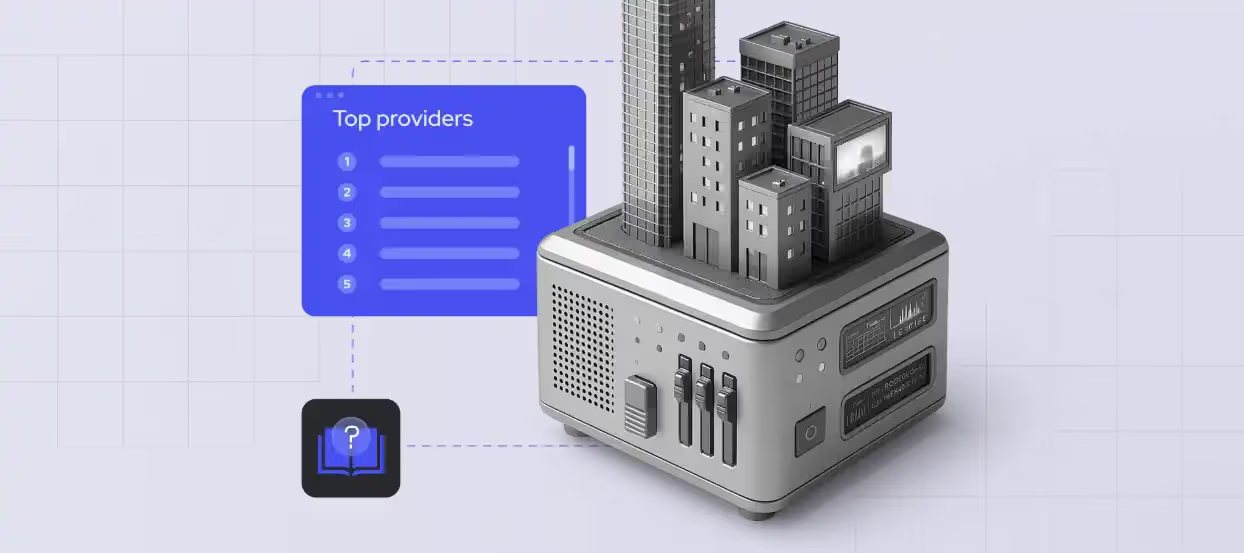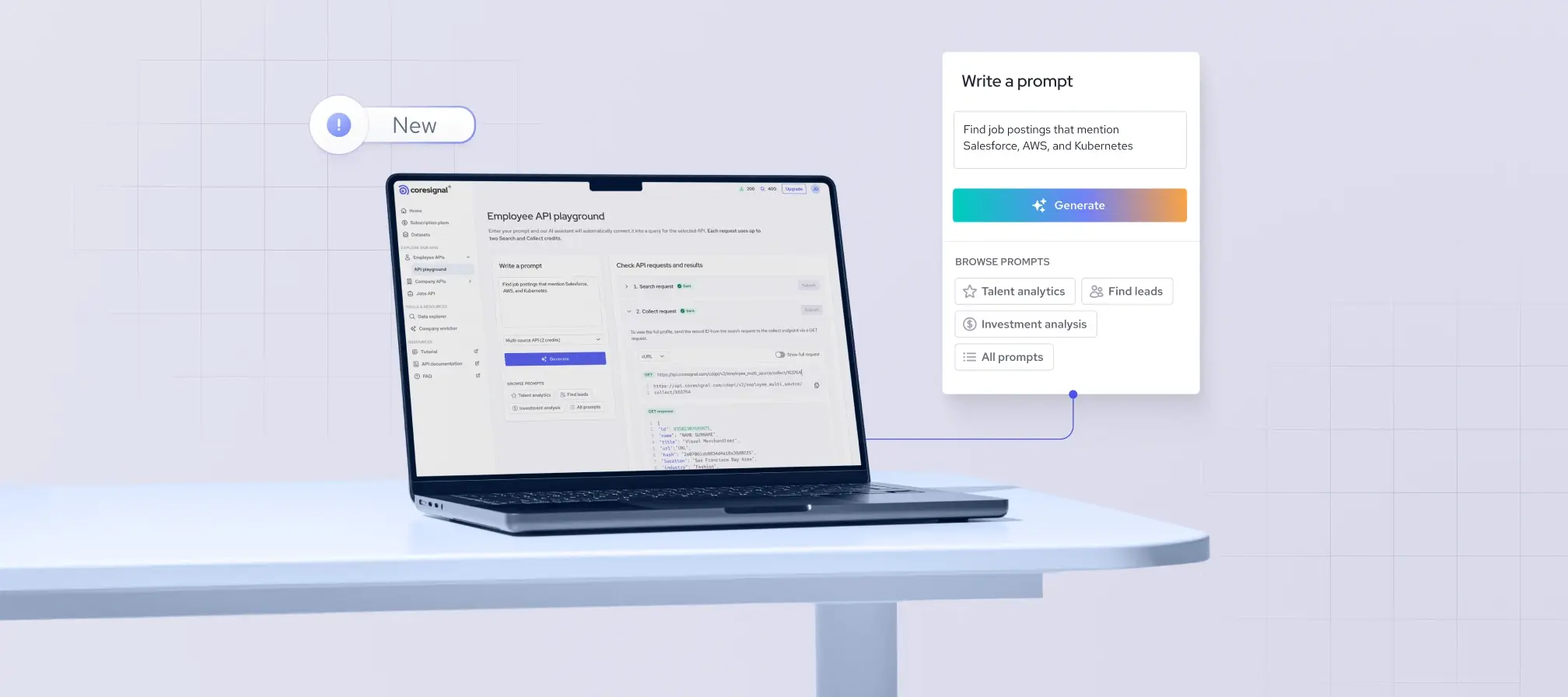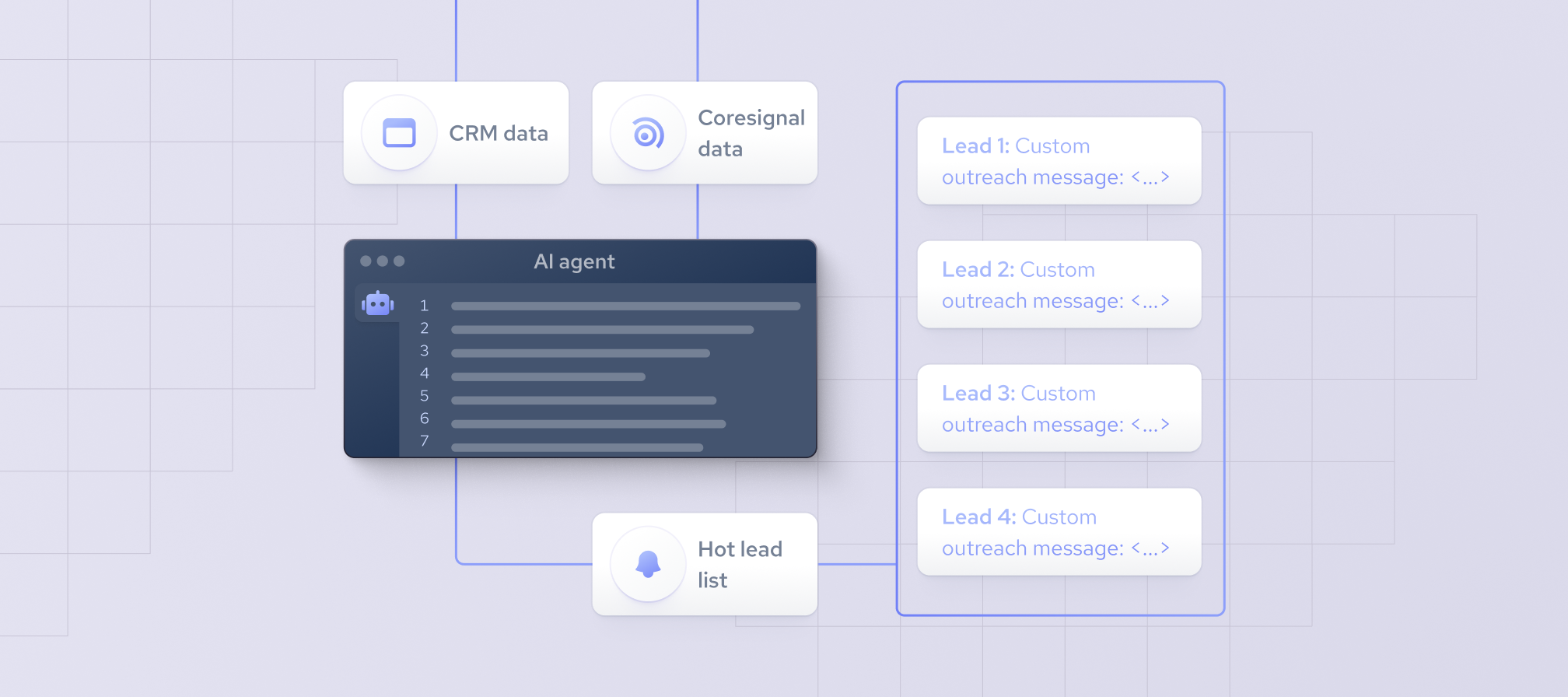Building reliable and innovative AI agents that offer something new to the market requires smart data. As these systems power more B2B workflows, such as lead scoring or market analysis, they rely on scalable, structured datasets to make high-stakes decisions.
But building with the wrong data sources for AI agents can quickly derail performance. Let’s explore the top datasets for AI agents in 2025 and what to look for in a reliable AI training data provider.
Types of data needed for AI agents
AI agents built for B2B use cases rely on structured datasets, context-rich B2B data that reflects how businesses in a broad sense operate and evolve. This data powers reasoning, pattern recognition, and decision-making across workflows because it ensures the agent has the knowledge needed to generate accurate, relevant, and scalable outputs.
Let’s take a look at the data categories that are popular when looking for datasets for AI agents.
Firmographic and technographic data
In the B2B market, this data primarily provides foundational context about companies: how they’re structured, where they operate, and what technologies they use, etc. Some company datasets also contain much more detailed information, such as ready-to-use data on a company's growth indicators, insights about its funding, or even key changes in key roles.
AI agents use it to segment targets, prioritize accounts, and tailor strategies based on business size, industry, or tech stack. It’s especially critical for sales and marketing agents that rely on accurate B2B intelligence.
Workforce and HR data
Includes data on hiring activity, role distribution, employee movement, and organizational structure. AI agents in HR tech, recruitment, or workforce planning use it to source talent, match candidates, and monitor organizational growth trends. It also supports competitive benchmarking and is used for generating insights, such as intent signals or company growth signals.
Market and financial data
Tracks funding information, mergers and acquisitions activity, revenue, and market movements. AI agents use this data to evaluate company health, detect emerging trends, and inform investment or expansion strategies. It’s essential for financial, investment, and market intelligence workflows.
Multimodal and behavioral data
Combines sources like social signals, product reviews, user behavior, and content engagement to provide a deeper understanding of the customers’ sentiments and the company’s online presence. AI agents leverage this data to adapt messaging, assess brand perception, and fine-tune recommendations.
Customer interaction data
Part of internal data (that isn’t acquired from external AI agent data providers), customer interaction data captures touchpoints like emails, chat logs, product usage, and support tickets to map customer behavior and preferences. Such datasets for AI agents make it possible to use this data to personalize responses, predict churn, and recommend next-best actions. It enables dynamic, context-aware interactions across sales, marketing, and support functions.
Top datasets for AI agents
Coresignal: Multi-source company, employees, and jobs datasets
Coresignal stands out for its multi-source datasets that provide a complete and structured view of companies and professionals. By aggregating and enriching public web data from numerous trusted sources, Coresignal helps data-driven businesses uncover deeper insights, whether you're tracking workforce changes, mapping market trends, or identifying new investment signals. Datasets cover company, employee, and job posting data. They are updated regularly to ensure freshness and accuracy.
ZoomInfo: Contact and intent data
ZoomInfo delivers detailed B2B contact and intent data by combining professional profiles with AI-driven buying signals and real-time insights. The platform claims high data accuracy across key fields, including work emails, direct and mobile numbers, job titles, org charts, and demographics. Its intent data leverages behavioral analytics to help sales and marketing teams identify and engage prospects showing active interest.
Crunchbase: Company funding and growth data
Crunchbase offers vast amounts of funding-related data collected from various sources, contributors, and with the help of their machine-learning algorithms and internal teams, making this platform one of the leading private companies’ funding information sources. Crunchbase also offers data solutions that reveal ready-made insights about companies’ growth based on multiple signals in company data.
AWS Data Exchange: Datasets marketplace
AWS Data Exchange serves as a third-party data catalog. It covers various data categories and also offers a selection of free datasets. It is simple to subscribe to and offers a seamless experience when using it with AWS data, analytics, and machine learning services.
PitchBook: Datasets for financial and investment insights
PitchBook is a private market data and financial research platform. According to their website, they offer at least 25 datasets that cover such data as company information, investments, investors, funds, financials, valuations, and contact information. A unique benefit that they offer for their customers is that a large data operations team “provides a human touch” to the information before it’s available for use.
Apollo.io: Leads datasets
Apollo.io provides company and contact data that includes emails, direct-dial phone numbers, firmographic details, and technographic information. The company builds solutions for sales; therefore, the data is regularly refreshed to keep such details as contact information up to date. Apollo.io also offers data enrichment solutions.
Appen: Custom annotation services
Appen specializes in providing datasets for building and improving AI. The company offers over 290 datasets with various types of data, including text, speech, video, image, and location data. The spectrum of data categories also shows a lot of variety; the dataset examples include such topics as product labels and offensive words lists.
How to choose a reliable data provider for your AI agent?
Data quality and bias
High-quality data sources for AI agents ensure they make decisions based on accurate, current, and representative information. Poor data introduces noise and systemic bias, which can lead to flawed outputs, compliance risks, and performance degradation. A good provider will offer transparency into sourcing methods, update cycles, and validation processes.
Scalability and customization
As AI agents evolve, so do their data needs. Your provider should support flexible data delivery methods, formats, and frequency, and provide solutions that are designed to handle increasing data volumes. This ensures the data remains aligned with your models, infrastructure, and growth.
Licensing and compliance (GDPR, CCPA, copyright)
Using non-compliant or improperly licensed data can expose your business to legal and reputational risk. Reliable providers offer clear licensing terms, source only public or authorized data, and stay in line with privacy regulations. This is especially important when handling employee or behavioral data.
Pricing models
When looking for data for AI agents, understanding the provider’s pricing structure helps prevent runaway costs and ensures alignment with your usage patterns. Some use subscription-based plans, while others charge per query or record, or a whole dataset. Choose a model that supports scale and experimentation without introducing financial uncertainty.
What are the biggest challenges when sourcing data for AI agents?
Bias and data gaps
Training on unbalanced data can lead to inaccurate or unfair outcomes. If your dataset overrepresents certain industries, regions, or demographics, your AI agent may draw misleading conclusions or reinforce existing biases. Spotting and correcting these gaps early is critical.
Cost vs. ROI
It’s important to have a method in place to measure the value of the data you’re buying. One of the best ways to ensure you don’t spend too much is to make sure that you use an AI agent data provider that offers flexible and competitive pricing.
Single-source data limitations
Relying on just one data source often means missing context, diversity, and depth. A single source can rarely provide full visibility into a business or market. What’s missing can be just as important as what’s included. Multi-source datasets offer a more holistic view, improving agent reasoning and reducing blind spots.
Data quality and integration
Datasets must be properly structured, cleaned, and normalized to work with existing systems. Inconsistent formatting, outdated records, duplicates, and other quality issues can cause friction during model training and slow time-to-value. Even high-quality data for AI agents is only useful if it integrates seamlessly into your workflows and model pipelines.
Final thoughts
To build effective AI agents for B2B applications in 2025, companies need access to high-quality, structured datasets tailored to specific workflows, such as sales, HR, and market intelligence.
Some data providers offer AI-ready data from key categories like firmographic, workforce, financial, behavioral, and customer interaction data. However, it's always important to assess data vendors based on quality and to be aware of everyday challenges, such as bias, cost, and integration hurdles, when sourcing data for AI agents.




